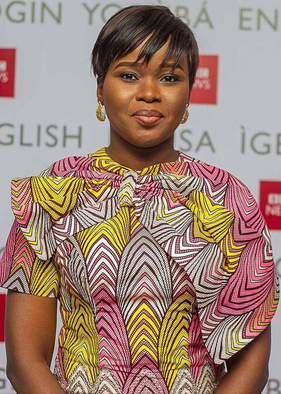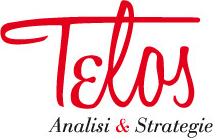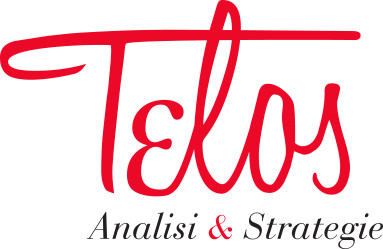July 2018, Year X, no. 7
Toyosi Ogunseye
The fearless lady of African journalism
“Investigative journalism is what I’ve done for the 15 years of my journalism career. I didn't consider it dangerous when I started (…) Another motivation for my investigative journalism is my dislike for injustice. Oppression gets my blood boiling (…) Investigative journalism is about impact. For me, impact is impact as long as one person or a group of people can live better lives through the stories I write.”
Telos: Woman, African and journalist. Tell us more about you.
Toyosi Ogunseye: I’m the Head of West Africa at the BBC, where I manage the five language services in West Africa. These services: Hausa, Afrique, Igbo, Pidgin and Yoruba serve our audiences in Anglophone and Francophone Africa. Before this role, I was Editor at the Sunday Punch. Punch is Nigeria’s most widely read newspaper. And before then, I had worked at Sun Newspaper and News Star Newspaper doing investigations and covering other beats such as politics, crime, health, environment, etc. I’m passionate about journalism and development. Biochemistry was my first degree. As a biochemist, I studied chemical processes and how they relate to living organisms. I learnt how to probe, use data and conduct proper qualitative and quantitative researches. All these have helped me as a journalist because I apply research tools to my stories. These eliminate errors and give clear, concise results. Research also helps you to be better informed and formulate ways of covering a story. That is a basic requirement for any journalist if you want your readers or audience to appreciate your work.
What does investigative journalism mean to you?
It means everything to me. On 30 April, BBC launched its Africa Investigations Unit, Africa Eye. It’s first story was titled ‘Sweet Sweet Codeine’, an investigation into how cough syrup is destroying millions of Nigerian youths. The documentary went viral and under 24 hours, the Nigerian government banned codeine. This is testament of the essence of investigative journalism, to tell stories that no one tells and to shed light on dark places with the hope that it will improve humanity. Investigative journalism is what I’ve done for the 15 years of my journalism career. I didn't consider it dangerous when I started. I just like to be thorough, so I always went the extra length with my stories. That extra effort helped me to discover more and see what others often missed. And before you know it, you have a big, investigative story on your hands. I often hear people say that the audience don’t like to read lengthy pieces, I disagree. People just don’t like boring stories, whether it’s long or short. I’ve discovered that a large number of people appreciate well-written and researched investigative stories that add value to them. Another motivation for my investigative journalism is my dislike for injustice. Oppression gets my blood boiling. I don’t like it when people intentionally treat others badly. Just tell me someone is oppressing you and I will be there immediately to fight for you. That’s my motivation, to use the tools and the opportunities that I’ve been given to help others live a better life.
What report of yours are you most proud of?
All of them are dear to me. I say this because I put my best into all my stories. I don’t know the number of stories I’ve written but most people remember the popular ones like an investigative story on a government hospital where babies were dying because of inadequate personnel and some of the new born sick babies had to share a tiny bed. There was outrage after the story was published and government had to act. Another one was an environmental story about how pollution from a steel factory was adversely affecting the health of residents in an estate. The residents volunteered to do medical tests that showed how badly their blood had been affected by the pollution. Some had cancer and others had breathing disorders due to the pollution. Personally, it’s the small things people don’t notice that mean the world to me. I remember doing story about a public school where a pupil fell into the school latrine and died. After the story was published, modern toilets were built in the school. That is memorable because the story saved the lives of other pupils. For about a year, I would randomly go to public schools and do stories on the state of their classrooms, toilet and water facilities. Not much attention is given to issues like this by relevant stakeholders and I believe it’s my duty to provide a better environment for learning through my stories.
About 10 years ago, a young lady who was working as a casual worker got her hand amputated at work and the company was not treating her well. They didn’t even want to pay compensation. A prominent lawyer in Nigeria read the story and took up her case. He ensured that the company took full responsibility. I wonder where she is now, but I’m happy I could help in my little way. Once I did a story on ten men who were wrongly accused of armed robbery; after my story, they were all freed. They might have been dead by now. These are stories that affect the life of the common man and they are dear to my heart. Often, we think investigative stories should be on a massive scale and should involve sending prominent politicians or businessmen to jail. But not necessarily. Investigative journalism is about impact. For me, impact is impact as long as one person or a group of people can live better lives through the stories I write.
Progressive Africans argue that tribalism is one of the most disruptive factors for the development of the continent. You are Nigerian, belonging to the Yoruba people. What is your view on this statement?
I agree that it’s disruptive and totally unnecessary to use our uniqueness to divide ourselves. One of the most beautiful things about Africa is our diversity and it should be used as a strength to help one another. The BBC recognises the strength of diversity and that was why it started the biggest expansion since the 1940s. In Africa alone, we now have 10 language services. West Africa has the five services I mentioned earlier while East Africa has five - Swahili, Somali, Ahmaric, Tigrinya and Afaan Oromo. These 10 language services in addition to Africa English and the Great Lakes Service, democratise access to quality information. There's something so beautiful about creating content and engaging our audiences in their mother tongues. It shows that we value their customs, traditions and culture. This is BBC’s way of ensuring that tribes, cultures and languages can shape, rather than divide the world.
Marco Sonsini
Editorial
Young, female, investigative journalist and African. What else? Her name is Oluwatoyosi Ogunseye, but everybody calls her Toyosi. Nigerian of the Yoruba ethnic group, one of the largest in West Africa which, along with many groups with related languages and cultures, is concentrated in the south-western provinces of Nigeria extending as far as the Atlantic coast. Africa is the future, and Toyosi already embodies the Africa of the future, the one it strives and ought to be. Educated, passionate, committed, well-loved and happy. She talks to us about an investigative journalism that doesn’t exist in Italy, if it has ever existed. That style of journalism that manages to change, little by little, things for people. This time, in my editorial, I’m not going to focus on what she’s told us, but on everything we’ve learnt about her and that motivated us to interview her. Toyosi always publicly expresses her gratitude for the people who opened the doors to journalism for her, starting with her first ‘boss’ Dipo Kehinde, crime news editor-in-chief. Kehinde introduced her to all her sources, took her to practically every police station in the states of Lagos and Ogun, and taught her ‘to look people in the eyes and ask uncomfortable questions.’ She got to the point where she knew all the suspects and every time she went to interview a new one, the old ones, when they saw her coming would scream playfully, Lady Sun! ‘I guess they were just amused by the young girl who enjoyed interviewing them’.
One Friday evening, Toyosi recalls, she went by motorcycle from Apapa to Sango and back (about 70 km) to get a story on how two men were detained because they'd stolen two chickens from the farm of the President at that time, Olusegun Obasanjo. Her director had been waiting for the story to print it in Saturday’s paper and ‘I couldn’t let him down.’ Toyosi could tell us a slew of stories like this one, but it would never be enough to describe what she defines as ‘the support I received in my professional growth.’ Toyosi is grateful to everybody, never really aware of her immense value. She takes each responsibility seriously, works hard, never backs down and doesn’t waste any opportunity that comes her way. She’s got initiative and gives the best of herself in every moment. She never gives up and she is willing to learn, change and grow. These are just a few of the things everybody who has ever crossed paths with Toyosi says about her. Today Toyosi is the head of services for West Africa for BBC World. However, she’s also studying for a PhD in Politics and International Relations at the University of Leicester. For all the rest, it’s enough to read this issue of PRIMOPIANOSCALAc. But it will never be enough. All this happens in Nigeria. Young, female, investigative journalist and African.
Mariella Palazzolo

Oluwatoyosi Ogunseye is the Head of West Africa for the BBC World Service, since January 2018. In her role, she manages BBC Afrique, Hausa, Igbo, Pidgin and Yoruba. Toyosi, this is how she is better known, has over 15 years’ experience as an investigative journalist and was the first female editor in the 45-year history of Punch, the most widely read newspaper in Nigeria. Ogunseye, who sits on the board of the World Editors Forum, is a Nigerian journalist with a passion for investigative reporting. She has won over 30 awards and was the first Nigerian to win the prestigious Knight International Journalism award. Toyosi is also the winner of the U.S. Presidential Precinct Inaugural Young Leader Award, 2016, which she received alongside former U.S. Secretary of State Madeline Albright. Ogunseye is a 2014 Laureate of the African Women in News Leadership Award given by the World Association of Newspapers. A 2014 Fellow of President Barack Obama’s Young African Leaders Initiative, she is an advocate for empowerment of young persons and gives self- development talks locally and internationally. She holds a BSc in Biochemistry from the University of Lagos, a PhD in Print Journalism from the Nigerian Institute of Journalism, a MSc in Media and Communication from the Pan-Atlantic University and she’s currently studying for a PhD in Politics and International Relations at the University of Leicester, UK. Toyosi is he first child of four children has ‘loving parents and siblings’. Her hobbies include reading, travelling, cooking and spending time with her loved ones.
Marco Sonsini







SocialTelos